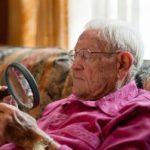 February is National AMD/Low Vision Awareness month, and to honor this, we’ve collected some of Bel Marra Health’s most informative articles regarding low vision in the elderly, AMD home remedies, diabetic retinopathy, as well as how these conditions affect quality of life and relate to depression.
February is National AMD/Low Vision Awareness month, and to honor this, we’ve collected some of Bel Marra Health’s most informative articles regarding low vision in the elderly, AMD home remedies, diabetic retinopathy, as well as how these conditions affect quality of life and relate to depression.
Low vision in elderly: Causes, symptoms, and treatment
Low vision in the elderly is a common problem, as the eyes undergo changes over time. For the most part, vision problems can be corrected with glasses or contact lenses, but if these can’t help, then surgery may be required. Even if corrections have been made to your vision but it still isn’t 20/20, this is known as low vision.
Advertisement
Low vision is when a person uses corrective devices or has undergone surgery to correct their vision and yet still reports difficulties performing daily tasks such as reading the mail or signing their name.
Those over the age of 65 are at the highest risk for low vision, and the risk is higher among individuals with diabetes or glaucoma. Continue reading…
 Home remedies to reverse age-related macular degeneration naturally
Home remedies to reverse age-related macular degeneration naturally
Age-related macular degeneration (AMD) is a common vision problem affecting people over the age of 40. The macula starts deteriorating over time, affecting one’s vision. You may find that you now need glasses, or that you have to hold text further or closer away from the eyes in order to see it.
AMD is the leading cause of vision loss in America, and the numbers are expected to rise as the population continues to age. The number of AMD cases is expected to hit 5.44 million by 2050.
There are two types of AMD: dry and wet. Dry AMD is a gradual vision loss resulting from thinning macular tissue. It is characterized by the present of yellow deposits, known as drusen, in the macula. Wet AMD is far worse than dry AMD. Wet macular degeneration takes place when abnormal blood vessels leak fluid or blood into the macula. As a result, patients may see spots in the center of their field of vision or they may notice that straight lines appear wavy since the macula isn’t smooth anymore. It is also worth noting that dry macular degeneration can progress into wet macular degeneration. Continue reading…
 Depression in age-related macular degeneration, diabetic retinopathy patients can be reduced with self-care tools
Depression in age-related macular degeneration, diabetic retinopathy patients can be reduced with self-care tools
Depression in patients with age-related macular degeneration and diabetic retinopathy can be reduced with self-care tools. The researchers conducted a randomized controlled clinical trial involving 80 participants with late-stage age-related macular degeneration or diabetic retinopathy. Participants also had mild depressive symptoms and vision acuity better than 20/200 (the legally blind threshold). The participants either received intervention in the form of large-print written and audio tools incorporating cognitive-behavioral principles plus three 10-minute telephone calls, or usual care. Continue reading…
 Age-related macular degeneration risk is higher in adults whose eyes adjust to the dark slowly: Study
Age-related macular degeneration risk is higher in adults whose eyes adjust to the dark slowly: Study
Age-related macular degeneration (AMD) risk is higher in adults whose eyes adjust to darkness slowly, according to research findings. Your eyes’ ability to adjust to the dark after bright light is called dark adaptation. Researchers believe the time it takes for you to adjust to darkness offers some insight into your AMD risk.
The research uncovered that individuals with the slowest dark adaptation response had the greatest risk of developing AMD. The researchers consider dark adaptation measurement instrumental in tracking AMD progression as well as assessing the effectiveness of medications. Continue reading…
 Quality of life in low vision patients can be improved with home-based visual rehabilitation
Quality of life in low vision patients can be improved with home-based visual rehabilitation
Advertisement
The quality of life in patients with low vision can be improved with home-based visual rehabilitation. Researchers found that home visits by rehabilitation specialists can significantly improve visual function in people whose vision cannot be corrected with contact lenses or glasses, compared to those who received standard treatment through hospitals or community-based services.
Researcher Prof. Tom Margrain explained, ‘With low vision affecting around two million people in the U.K., it’s important to identify visual rehabilitation services that can improve the independence and quality of life of those with sight loss. We already know that visual rehabilitation is beneficial to people with low vision, but what we don’t know is the best method of delivery. Our new research reveals that a home visit system is very beneficial, delivering care and advice that can promote independence and recover lost skills.” Continue reading…
Related: Experimental drug may lead to simpler treatment of macular degeneration
